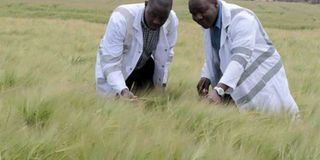Research is coming of age in Africa

Researchers inspect a new barley variety at Sansora Farm in Mau-Narok, Nakuru County on January 11, 2018. It is clear that research in Africa is finally coming of age and will earn its rightful place at the global table. PHOTO | AYUB MUIYURO | NATION MEDIA GROUP
What you need to know:
There is growing interest in evidence and decision making to which local research is making a worthwhile contribution.
A global market research study conducted in 2010 revealed that the research industry in Africa was on a growth trajectory.
Another positive though somewhat marginal change indicator is the emergence of local research investors.
There were only a handful of African research agencies 15 years ago.
Research was a mystery to the majority and investors were even fewer.
Research was the preserve of large international corporations and donor organisations.
Not only could they afford the spend; they also had in-house consultants who understood research, its importance, and how to work with it.
Local companies could not afford this.
Back then, the research career of many a Kenyan was largely happenstance and very challenging because they came into the job without the prerequisite academic and professional training.
RESEARCH METHODOLOGY
There were few or no tertiary-level courses that focused purely on research methodology. The few existing research agencies were the only ‘real’ training ground for most people.
Fast forward and one finds remarkable change today.
A global market research study conducted in 2010 by ESOMAR (formerly known as the European Society for Opinion and Market Research) revealed that the research industry in Africa was on a growth trajectory and “remained remarkably robust”.
Kenya was deemed particularly outstanding, recording a 27.6 per cent growth. Consumption of research output has expanded from largely poorly understood political opinion polls on TV to more in-depth conversations and engagements with a public that is more switched on.
There is growing interest in evidence and decision making to which local research is making a worthwhile contribution.
Another positive though somewhat marginal change indicator is the emergence of local research investors.
INTERNATIONAL BUYERS
The lion’s share of research investment in Africa still comes from international buyers, who are highly attuned to the fact that this is an investment in the truest sense of the word. Return on investment (ROI) is considerable down the road, but also in the short term.
Global statistics from 2015 reveal that firms that do not invest in research at all record a minimal growth of 2.8 per cent and 11 per cent profitability, those that invest in research occasionally grow at 20 per cent and record 14 per cent profit, while those with frequent research investment (at least quarterly) enjoy 33 per cent growth and 20 per cent profitability.
While the local companies are slower in making research investment, there are more of them now embracing research and willing to invest in it.
Many an individual and small business owner have articulated their need for research as they venture into new territories.
This is hopefully a sign of better things to come, where we will cease to look to international research buyers to do all the investment.
Besides the revenues generated from research buyers, there are other tangible investments that contribute to the growth and maturity of a research industry.
INFRASTRUCTURE
They include greater human resource capabilities, communications capacity, and technical infrastructure, which Africa doesn’t have enough of.
The effect of this in a global economy is that critical development conversations tend to be dominated by First and Second World countries, while emerging economies are drowned out.
To change the status quo, we need to steer away from rhetoric and take some real action. The onus is on the local research agencies and institutes to develop mechanisms to help smaller organisations and individuals to build capacity, raise their profiles, and share their research with a wider audience.
Research PLUS Africa is a frontrunner in this regard, having recently sponsored the establishment of a world-class research centre at the Marist International University College.
The centre will be officially launched on February 16, and will underscore excellence by ensuring that budding researchers are equipped with a real-life skillset that will adequately prepare them for careers, and endow them with the ability to collate credible evidence and make critical decisions.
This will empower them to generate and innovate in research, and ultimately contribute authoritatively to development discussions at local and global levels.
Having taken stock of the development of the research industry in Africa and with the coming of initiatives such as the Marist Research Centre, it is clear that research in Africa is finally coming of age and will earn its rightful place at the global table.
Ms Masita is the CEO, Research PLUS Africa, and director, Marist Research Centre. [email protected]




